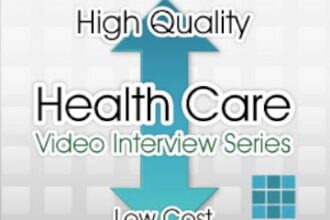 I’ve written a number of articles and a few video interviews on job opportunities in digital health recently and have received a steady stream of questio
I’ve written a number of articles and a few video interviews on job opportunities in digital health recently and have received a steady stream of questio
 I’ve written a number of articles and a few video interviews on job opportunities in digital health recently and have received a steady stream of questions since then. Given healthcare IT professionals can make $90,000 or more annually, there has been growing interest in the industry.
I’ve written a number of articles and a few video interviews on job opportunities in digital health recently and have received a steady stream of questions since then. Given healthcare IT professionals can make $90,000 or more annually, there has been growing interest in the industry.
To help separate fact from fiction and dive a little deeper in to the realities of these opportunities, I reached out to Beth Kelly, a freelance writer from Chicago, IL to summarize the projected outlook for specialized positions within the field of health IT. Careers in healthcare IT are appealing whether your preference lies within the computer or medical sciences; what’s clear though is to succeed you’ll need to have your passion fit somewhere between both. As positions in the industry are constantly evolving, the ability to adapt to new technology is also crucial — whatever is “cool” today will be different tomorrow.
As healthcare providers and physicians strive to implement new technology systems, the expertise of HIT professionals will guide the industry into the future so knowing the Outcome Driven Innovation (OID) and JTBD of clinical professionals will be a differentiator for those who possess such skills. The market for health care information technology continues to show enormous growth potential – with no signs of slowing down any time soon. Here’s what Beth thinks the outlook is:
General Qualifications and Useful Certifications
It’s clear that the expanding field of healthcare IT affords plenty of opportunities. But of course, making the move into this field isn’t as simple as picking up the phone and interviewing. Qualifications are important — in a recent salary survey report completed by HealthITJobs.com, it was noted that certified workers are on average making $10,000+ more than those without certifications. If you are an IT worker currently, CISSP, CCNA, and PMP are a few technical certifications that are in high demand in Healthcare IT. But beyond the classroom, health IT requires a unique set of skills, and not all of them are related to technology. In healthcare, the right applicant needs to understand more than codes and processes. Many hiring managers look for applicants with “soft skills” who are willing to work in a highly collaborative environment. Applicants for HIT positions need to be aware that in a hospital environment, their position is not the star of the show. Ultimately the healthcare world revolves around the patient, and IT roles provide supportive care. In many cases when hiring, institutions prefer applications with a combination of IT and clinical skills.
Optimizing opportunities afforded by the changing healthcare landscape requires a lot of hard work and insight into the diverse nature of the healthcare IT job market. Whether you are transitioning to IT from a clinician position, or you have an IT background already but are new to healthcare, challenges are inevitable. But in an increasingly digital world, where people use technology in more ways perhaps than they even realize, an HIT skill set is almost guaranteed to pay off.
The healthcare sector of IT is as diverse as the industry itself. There are numerous areas in which to specialize; the following domains being several of the most promising.
Mobile Healthcare
Looking purely at the numbers, Americans are inseparable from their phones. And with nearly one third of all mobile applications being health related, the opportunity to access and utilize vast amounts of health data is there, also. As Silicon Valley tech companies take a greater interest in mobile health devices, advances in analytic software now make it possible to capture illuminating data about our daily lives. The sum of this information is aimed to transform medicine. Even as privacy concerns loom, the ubiquity of smartphones and tablets promises career opportunities in the realm of HIT.
Joseph Hobbs, CIO at Community Hospital at Anderson located in Anderson, Indiana, had this to say about mobile technologies: “This is a huge topic for any organization. Whether it is a mobile cart, a tablet or a smartphone, you need to give caregivers access at their fingertips. The [other] challenge in healthcare is that it’s not a one-size-fits-all initiative. Beyond just finding a solution for all you then have to worry about security and application presentation to all of these types of devices.”
Many health professionals agree that the data from medical devices and data from modern EHR solutions should be integrated. When mobile devices are capable of being linked to EHR, physicians can provide patients with appointment alerts and medication reminders, as well as additional medical assistance. In the remote patient monitoring space, cell service provider Verizon represents the Converged Health Management solution, one of the first products that hopes to bridge the gap between monitoring devices and EHRs. Partnering with Ideal Life, a medical device company, Verizon’s platform is capable of measuring blood pressure, oxygen saturation, glucose levels and weight.
The market for mobile healthcare apps promises many new opportunities for with room tremendous growth and earning potential. According to German market research firm research2guidance, the worldwide market for mobile health applications and their corresponding services reached $2.4 billion in revenue in 2013 and will grow to $26 billion by the end of 2017.
Mobile apps are becoming increasingly significant in the healthcare community, their influence extending throughout both the medical and insurance industries. Mobile app developer positions are in extremely high demand. With medical health app growth ahead of the general mobile market, there are tremendous number of opportunities for people interested in these positions. According to the U.S. Bureau of Labor and Statistics, from the years 2010-2020, there is a projected growth rate of 57.4% for software application developers. For software systems developers, there is a projected growth rate of 71.7%. It’s estimated that overall employment in the industry will continue to grow rapidly.
Clinical Informatics
Clinical analytics are a top priority for two reasons: data mined by those with analytic skill can be used to understand population health, helping better identify infectious disease outbreaks and other population health trends, and can also be used to help a hospital’s bottom line. Big data allows providers to better see how their resources are spent, and where they can trim the fat. The recent deal between Apple and IBM only promises to fuel the market for data analyst positions.
In the current market, an advanced degree in health informatics is very useful. Because of the move toward electronic health records, hospitals and health systems need qualified people to undertake complex projects. A degree opens the door to working for a hospital, a health system, a vendor that sells electronic records or computer software or as a professional consultant. From 2010 to 2020, the U.S. bureau of Labor has said that employment of computer systems analysts in computer systems design and related services will grow 43 percent. Businesses will typically hire them to reorganize IT departments to operate more efficiently.
HIPAA, Meaningful Use and ICD-10 Project Managers
Now that both HIPAA and HITECH are being fully enforced, affected entities can be audited for compliance at any time. At Stage 2 of the HITECH act a certain percentage of provider’s patients must use and interact with patient portals. Navigating HIPAA privacy regulations and the proprietary nature of the portal software is a convoluted process. And the transition from ICD-9-CM to ICE-10-CM is a hefty task as well; ICD-9-CM contains 13,000 3-5-character alphanumeric diagnosis codes with 855 code categories. ICD-10-CM contains 68,000 3-7-character alphanumeric diagnosis codes with 2,033 code categories. In the transition to greater coding specificity, hospitals typically look for someone who has worked as a coder and in health information management roles.
As health organizations strive toward integrating ICD-10 throughout every aspect of their business, there is an enormous need for medical coding and billing specialists capable of working with the updated diagnostic coding system. ICD-10 skills will put you in the front running for an in-demand position such as project manager, ICD-10 coding specialist, or even ICD-10 educator.
Skills in HIPAA Compliance qualify you for a high level HIPAA Privacy Officer position, a role that typically pays over $60,000 annually. Meaningful Use Director positions, a recent addition to the healthcare landscape, can pay anywhere between $35-80,000 each year.
Privacy and Data Breach Prevention Specialists
Health Information privacy specialists are in extremely high demand. EHR applications, particularly when accessed on mobile devices, require enhanced security access and monitoring. Data breaches are expensive, embarrassing, and damaging to to health groups, but many physicians still neglect to encrypt the patient information they’ve stored on various devices. Healthcare organizations need to take security seriously, and bring on IT professionals to ensure they are doing everything they can to reduce instances of identity theft.
Information security spending is expecting to increase nationwide, especially within industries that deal with sensitive information such as hospitals. New security measures are added and reconfigured constantly, and as a result the demand for privacy and data protection specialists is always high. Job growth for this title is projected to grow upwards of 25% within the next 5-10 years.
Pharmaceutical companies, naturally interested in joining the digital health movement as well, have found it more difficult to gain traction. A 2013 Deloitte survey found that, while people trust doctors and medical professionals the most, they trust companies like WedMD next and then internet search results. Big pharma companies come in dead last. Healthcare organizations and pharma companies are competing, not within their respective sectors, but against one another. Digital pharma is only now beginning to take off. According to M2i2′s Chief Medical Information and Innovation Officer Sachin Jain in a May interview, “the ultimate incentive is that we as a company are gradually finding our way into the outcomes improvement business, as opposed to the pill and vaccine business, and as we do that, I think we realize that data and technology and HIT is going to be a critical enabler.”
Getting started in healthcare IT is not as intimidating as it may seem. For new job seekers, however, it is important to research the different types of positions available and where you may be most helpful. Additionally, for those without a background in health, learning clinical workflows and the other processes that go into healthcare is imperative. Experience, if it’s outside the realm of healthcare, can be transferable, but you will need to be sure to tailor your resume and cover letter around the language of the health industry. If possible, volunteer in a hospital or similar healthcare IT setting to obtain hands-on experience.
Unlike humans, who can handle diversity, computers hate variations. Hospitals and physicians have experienced workflow disruptions and productivity loss as they adopt more advanced EHR systems. Health IT workers, cogs in the digital health machine, fulfill hybrid roles that blend the skills of clinicians and traditional IT workers. As the nature of the healthcare industry continues to evolve, the future for healthcare IT continues to look very bright.
health IT professionals / shutterstock








